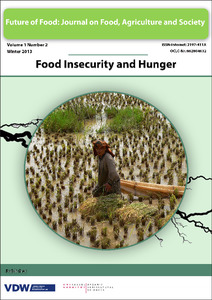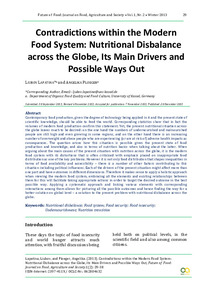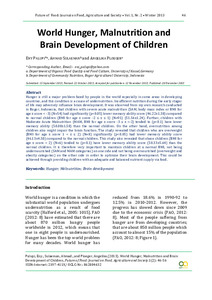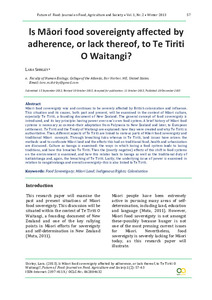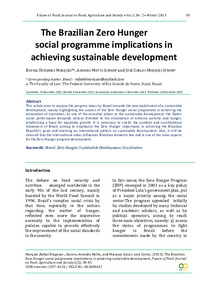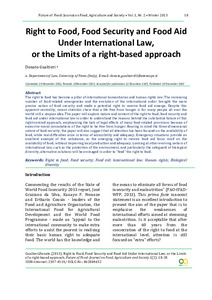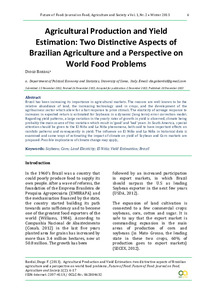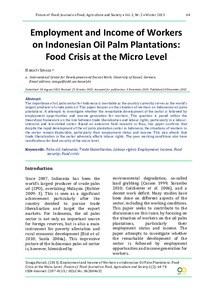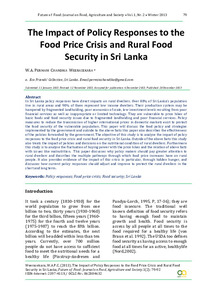Suche
Anzeige der Dokumente 1-9 von 9
Zeitschrift
 Vol. 1 No. 2 (2013): Food Insecurity and Hunger
Vol. 1 No. 2 (2013): Food Insecurity and Hunger
(Department of Organic Food Quality & Food Culture, Faculty of Organic Agricultural Sciences, the University of Kassel and the Federation of German Scientists (VDW), 2013)
Aufsatz
 Contradictions within the Modern Food System: Nutritional Disbalance across the Globe, Its Main Drivers and Possible Ways Out
Contradictions within the Modern Food System: Nutritional Disbalance across the Globe, Its Main Drivers and Possible Ways Out
(Department of Organic Food Quality and Food Culture at the University of Kassel, Germany and Federation of German Scientists (VDW), 2013-12-20)
Contemporary food production, given the degree of technology being applied in it and the present state of scientific knowledge, should be able to feed the world. Corresponding statistics show that in fact the volumes of modern food production confirm this statement. Yet, the present nutritional situation across the globe leaves much to be desired: on the one hand the numbers of undernourished and malnourished people are still high and even growing in some regions, and on the other hand there is an increasing number ...
Aufsatz
 World Hunger, Malnutrition and Brain Development of Children
World Hunger, Malnutrition and Brain Development of Children
(Department of Organic Food Quality and Food Culture at the University of Kassel, Germany and Federation of German Scientists (VDW), 2013-12-20)
Hunger is still a major problem faced by people in the world especially in some areas in developing countries, and this condition is a cause of undernutrition. Insufficient nutrition during the early stages of life may adversely influence brain development. It was observed from my own research conducted in Bogor, Indonesia, that children with severe acute malnutrition (SAM, body mass index or BMI for age z score < -3) (N=54) had significantly (p<0.05) lower memory ability score (46.22±1.38) compared to normal children ...
Aufsatz
 Is Māori food sovereignty affected by adherence, or lack thereof, to Te Tiriti O Waitangi?
Is Māori food sovereignty affected by adherence, or lack thereof, to Te Tiriti O Waitangi?
(Department of Organic Food Quality and Food Culture at the University of Kassel, Germany and Federation of German Scientists (VDW), 2013-12-20)
Māori food sovereignty was and continues to be severely affected by British colonisation and influence. This situation and its causes, both past and present, will be examined in the context of Māori culture, especially Te Tiriti, a founding document of New Zealand. The general concept of food sovereignty is introduced, and its key principle: having power over one's own food system. A brief history of Māori food systems is necessary as context–their adaptation from Polynesia to New Zealand and later, to European ...
Aufsatz
 The Brazilian Zero Hunger social program implications in achieving sustainable development
The Brazilian Zero Hunger social program implications in achieving sustainable development
(Department of Organic Food Quality and Food Culture at the University of Kassel, Germany and Federation of German Scientists (VDW), 2013-12-20)
This article aims to analyse the progress taken by Brazil towards the accomplishment of a sustainable development, mainly highlighting the success of the Zero Hunger social programme in achieving the elimination of starvation. As one of the essential pillars to the sustainable development, the State’s social performance demands actions directed to the elimination of extreme poverty and hunger, establishing a basis for equitable growth. It is necessary to clarify the juridical and constitutional framework of Brazil, ...
Aufsatz
 Right to Food, Food Security and Food Aid Under International Law, or the Limits of a right-based approach
Right to Food, Food Security and Food Aid Under International Law, or the Limits of a right-based approach
(Department of Organic Food Quality and Food Culture at the University of Kassel, Germany and Federation of German Scientists (VDW), 2013-12-20)
The right to food has become a pillar of international humanitarian and human rights law. The increasing number of food-related emergencies and the evolution of the international order brought the more precise notion of food security and made a potential right to receive food aid emerge. Despite this apparent centrality, recent statistics show that a life free from hunger is for many people all over the world still a utopian idea. The paper will explore nature and content of the right to food, food security and food ...
Aufsatz
 Agricultural Production and Yield Estimation: Two distinctive aspects of Brazilian Agriculture and a perspective on world food problems
Agricultural Production and Yield Estimation: Two distinctive aspects of Brazilian Agriculture and a perspective on world food problems
(Department of Organic Food Quality and Food Culture at the University of Kassel, Germany and Federation of German Scientists (VDW), 2013-12-20)
Brazil has been increasing its importance in agricultural markets. The reasons are well known to be the relative abundance of land, the increasing technology used in crops, and the development of the agribusiness sector which allow for a fast response to price stimuli. The elasticity of acreage response to increases in expected return is estimated for Soybeans in a dynamic (long term) error correction model. Regarding yield patterns, a large variation in the yearly rates of growth in yield is observed, climate being ...
Aufsatz
 Employment and Income of Workers on Indonesian Oil Palm Plantations: Food Crisis at the Micro Level
Employment and Income of Workers on Indonesian Oil Palm Plantations: Food Crisis at the Micro Level
(Department of Organic Food Quality and Food Culture at the University of Kassel, Germany and Federation of German Scientists (VDW), 2013-12-20)
The importance of oil palm sector for Indonesia is inevitable as the country currently serves as the world’s largest producer of crude palm oil. This paper focuses on the situation of workers on Indonesian oil palm plantations. It attempts to investigate whether the remarkable development of the sector is followed by employment opportunities and income generation for workers. This question is posed within the theoretical framework on the link between trade liberalisation and labour rights, particularly in a ...
Aufsatz
 Impact on Policy Responses to Food Price Crisis and Rural Food Security in Sri Lanka
Impact on Policy Responses to Food Price Crisis and Rural Food Security in Sri Lanka
(Department of Organic Food Quality and Food Culture at the University of Kassel, Germany and Federation of German Scientists (VDW), 2013-12-20)
In Sri Lanka policy responses have direct impacts on rural dwellers. Over 80% of Sri Lanka’s population live in rural areas and 90% of them represent low income dwellers. Their production system may be hampered by fragmented landholding, poor economics of scale, low investment levels resulting from poor financial services as well as inappropriate or limited technology. They are vulnerable to price hikes of basic foods and food security issues due to fragmented landholding and poor financial services. Policy measures ...

